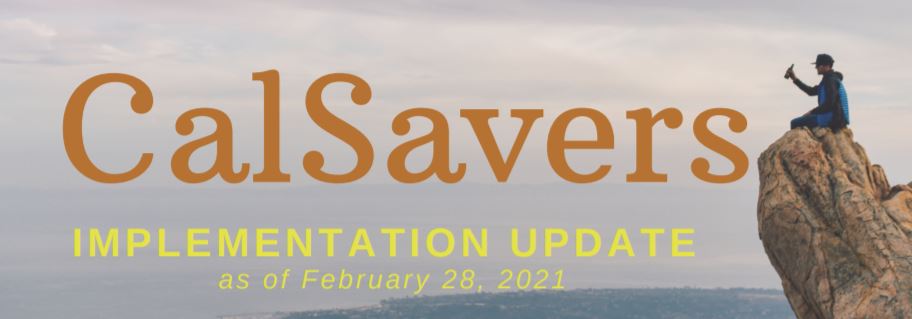
Click here for more information on the California state-run retirement fund that inspired the Virginia legislation. Source: Georgetown Center for Retirement Incentives.
by Steve Haner
Next week’s reconvened General Assembly session will decide whether only full time employees of Virginia’s small businesses will be pushed into a new state-sponsored retirement savings plan, or part-time workers will join them there.
The big question is whether this is something the state should be doing at all, but on that the Assembly has spoken. People who are not covered by an employer-sponsored retirement plan will be forced to send money to a state “Virginia Saves” account unless they take explicit steps to opt out.
Governor Ralph Northam’s amendment to expand House Bill 2174 will be voted on by legislators at the reconvened session April 7 and must be approved by both chambers. If rejected, he could then veto the bill, but that seems unlikely. More likely is that efforts to expand the program will continue in future sessions, as the sapling grows into a mighty oak.
The bill as introduced in the House of Delegates covered all workers but passed the Senate limited to employees with 30 or more hours per week. Increasing coverage to part-time employees greatly expands the pool of covered workers. It also greatly expands the pool of covered businesses, since to be drawn into the state-managed retirement mandate they need 25 eligible employees.
Expected to begin in July 2023, the program will require all covered employees to make payroll deductions into a retirement account managed by the Virginia College Savings Plan, already managing and investing higher education savings accounts. Employers are required to process their employees into the plan but are not at this point expected to provide matching funds.
Many if not most details still need to be worked out, including the exact percentage of the employee’s pay that will be deducted and the opt-out rules. In some of the handful of other states doing this, the deduction is 5% to 6% and the accounts are Roth IRAs, meaning there is no tax deduction for the contribution but when retirement comes, withdrawals are tax free. But this could also be a traditional IRA with the income tax deduction.
This is just one more example of full Democratic control of state government expanding state authority over the terms and conditions of employment. According to a report ordered by the 2020 General Assembly, about 45% of Virginia’s workforce or about 1.2 million employees are not covered by an employer-sponsored retirement plan.
The early data on three other states doing this does not indicate it will produce comfy retirements years. Researchers at Georgetown are compiling data on California, Oregon, and Illinois, who are about three years into their programs. Massachusetts and Washington State are preparing to jump in.
The employee opt-out rates in the three tracked programs range from just under 30% to almost 36%. The average account balance is only about $600 and about 20% of accounts were subject to withdrawals as well as contributions during the reporting periods.
The more frequent the withdrawals, obviously, the less value these accounts will accrue down the road. The pandemic recession might not have been the best time to judge this, but it doesn’t seem to have produced dramatic results in those other states. It probably won’t in Virginia, either.
Nothing is stopping any of these people from taking advantage of existing Roth or Traditional IRA accounts today. Small employers who offer such accounts as employee benefits have umpteen choices and get tax advantages to themselves as a strong incentive. People are making the decision not to save, as wise as that would be, often out of necessity.
Virginia’s minimum wage is about to go to $9.50 per hour, or about $20,000 per year for 40-hour weeks. Pulling another $1,000 out of those paychecks, with or without a tax advantage, is a significant loss of disposable income. Many won’t do it, and many who do will at some point seek the recoup the funds.
The planning reports leading up to passage claimed small employers were eager for such a state-managed option, but the bill was fiercely fought during the 2021 session with many business groups opposed. The same groups will resist the Governor’s amendment to expand this to every employee with any work hours at all.
The 2020 report supporting this move claimed that the state is the right entity to take on this function because: “6. Virginians generally trust the state to perform responsibly, particularly as it relates to fiduciary responsibilities and investment management.” Did anybody ask unemployment recipients, many still waiting for months for claims?
Major portions of the five-page bill are dedicated to preventing any liability on the part of the state. This is not a version of the Virginia Retirement System for private employees, or comparable to Social Security.
No act or undertaking of the Board is a debt or pledge of the full faith and credit of the Commonwealth or any political subdivision of the Commonwealth, and all such acts and undertakings are payable solely from the Program. The Commonwealth shall have no obligation for payment of benefits arising from this chapter.
And then:
In no event shall the Commonwealth, the Program, the Board, any Board member, or any participating employer be liable for any losses incurred by Program Trust investments or otherwise by any employee or other person as a result of participating in the Program.
If this all goes south one day, explaining and maintaining that lack of state accountability to account holders or to a federal judge may be a challenge.